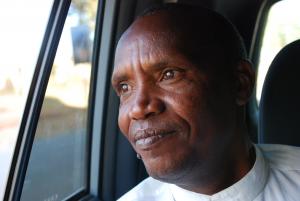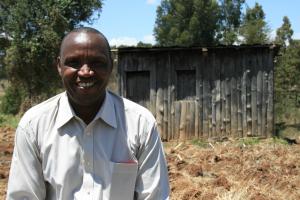When his home was burned down and relatives killed in Kenya’s ethnic violence, Joseph Wainaina wanted revenge. Now he ‘does peace’ criss-crossing the land building trust at the grassroots level. He talks to Mike Brown.
 The pain is still raw. As 13 of us pack into a matatu (taxi van)and rumble out of Eldoret, Joseph Wainaina points to trees on the horizon. ‘That’s my birthplace… You know I have two mothers.’ His birth mother was Kikuku like his father; the second, who raised him from the age of six, a Kalenjin. ‘That’s what saved me. Because I could speak her language, they did not kill me,’ he says, describing the attacks in 1992 when his home was burned and his farming land taken in a tribal conflict. It happens every five years, Wainaina adds sadly… with each election. ‘We were in church that Sunday morning. We could hear the screams so we just fled. We could not go back.’ Where did he go? ‘We didn’t know – just wherever the truck was taking us.’
The pain is still raw. As 13 of us pack into a matatu (taxi van)and rumble out of Eldoret, Joseph Wainaina points to trees on the horizon. ‘That’s my birthplace… You know I have two mothers.’ His birth mother was Kikuku like his father; the second, who raised him from the age of six, a Kalenjin. ‘That’s what saved me. Because I could speak her language, they did not kill me,’ he says, describing the attacks in 1992 when his home was burned and his farming land taken in a tribal conflict. It happens every five years, Wainaina adds sadly… with each election. ‘We were in church that Sunday morning. We could hear the screams so we just fled. We could not go back.’ Where did he go? ‘We didn’t know – just wherever the truck was taking us.’
Five minutes down the road is an even fresher memory. ‘That’s the place where my aunt died,’ he says pointing to the shell of a building by the side of the road. During the post-election tribal clashes in 2007, riots ripped through this area. ‘She tried to flee but they pushed her back inside the burning house.’ Her two children are cared for by another family member who fled the violence. He puts his head in his hands for a moment, and weeps silently.
‘It is us,’ he says, recovering. ‘What all of us have done to each other.’ In this town, the epicentre of ethnic fighting, Kikuyu took over many of the properties left by British colonial farmers, originally belonging to Kalenjin pastoralists. ‘We have to work together to rebuild our communities.’
With Kikuyu, Kalenjin and Maasai blood in his veins, Wainaina has criss-crossed rural Kenya by bicycle, motorbike and matatu, building trust at a grassroots level. He’s still doing it, with representatives of Kenya’s various tribeswho go in small teams wherever needed. They are using the documentary, An African Answer, produced by IofC’s FLTfilms, which captures the trust-building work of two Nigerians, Imam Muhammad Ashafa and Pastor James Wuye, in the Rift Valley after the violence in 2007.
But his agenda after that attack in 1992 was radically different: revenge. Initially, it was just survival. With his wife, mother, and six small children, he was taken to Ndaragwa, where other IDPs (Internally Displaced Persons) were camped. After two weeks, a man noticed him under a tree just outside the small town, crying in desperation and hunger, took pity on him and brought his family to a café for such a good meal that ‘my children were ill’. He advised Wainaina to look for work down a certain road. Next day Wainaina set out. An old man, mistaking him for a local resident, yelled out asking him to help string a barbed wire fence. After several hours of sweated labour, the old man discovered Wainaina’s situation. He fetched the family in his tractor and offered them a small hut and tiny plot on his farm.
Gratitude did not cure his thirst for revenge, however. Securing a job as a guard in the Department of Environment, he and others worked secretly, training 300 Kikuyu youths in the forest to avenge their suffering. Telling the story as we travel, he points down a road into nearby Uganda ‘where we used to steal coffee’. Money was needed for guns. Through a nephew, Joseph Karanja, he was introduced to the late Colonel Alan Knight, a widely-respected settler who had made a public apology in pre-independence Kenya for the ‘arrogance and selfishness with which the whites have lived in your country’. Wainaina thought he might appeal for some funds. But Knight questioned his story. ‘I couldn’t hide my bitterness. He saw it on my face.’ After talking for hours, Knight asked Wainaina if he was a Christian. With Wainaina’s passionate affirmation, Knight asked to pray with him through the Lord’s Prayer, in Swahili. When they got to ‘forgive us our sins as we forgive…’ Knight suddenly banged the table. Without ending the prayer he asked, ‘Can you honestly tell me you have forgiven?’
He left Wainaina to stew on the question. ‘I could not resist. I was lying to my Maker,’ remembers Wainaina. After a sleepless night, he wept as, early next morning, he told Knight that he wanted to return to Eldoret to apologize for his hatred before his Kalenjin neighbours. Knight provided the bus fare – a lot less than what Wainaina had come for – and dropped him at the bus station.
Arriving in Eldoret, Wainaina went directly to his Kalenjin neighbors. It was difficult. He saw his land, remembered his home, the cows and sheep he had lost. But he had come to apologize and did, admitting his preparations for revenge. ‘Some were not happy. Some refused to believe me. A few said “sorry”.’ But when he went to the young men he was training to fight, most were furious, seeing him as a betrayer. ‘Some still today are bitter about it.’
 Recently Wainaina was shown on Citizen TV news working with volunteer peacemakers in that same area outside Eldoret to rebuild homes destroyed in 2007. But it has been a long journey to this point.
Recently Wainaina was shown on Citizen TV news working with volunteer peacemakers in that same area outside Eldoret to rebuild homes destroyed in 2007. But it has been a long journey to this point.
In 1995 he felt moved to quit his job and devote himself to helping others who had suffered like him, and those who were perpetrators. His story got around churches, and he began travelling huge areas of rural Kenya. In his modest farmhouse near Ndaragwa, he shows us a small TV, video-player and car-battery, which he lugged on the back of a bicycle – showing IofC films carrying the message of a change of heart and relationships. In time he added videos on HIV/AIDS because of the sufferers he encountered. ‘It is funny how I meet people,’ he grins. ‘It must be God’s work. Sometimes in a matatu people ask what I do and I say, “I do peace.”’
But again in 2007, the five-year violence cycle kicked in… with a vengeance. Wainaina and his wife, Anne, were overwhelmed by 39 relatives and others who descended on their small home for safety. Two relatives had been killed, a girl raped. ‘I’m a human being,’ he remembers. ‘Double the anger came to me.’ There was no time for anything but sheltering those who came. It was hectic. Some friends raised money for blankets. Through a troubled night, again ‘the inner voice of God spoke to me: “Joseph, you are scratching old wounds. Remember your own mother, brother and his family were shielded by Kalenjin friends.”’
And so his work started all over again. He held a ‘retreat’ for 210 people, around his home, ‘just about reconciliation’. Similar meetings were arranged in other places. Then the film An African Answer provided a powerful tool, which he uses with his colleagues in the IofC network in Kenya and with many other groups. In January, the film was screened in Burnt Forest, where it was originally shot – showing Kalenjin and Kikiyu community leaders in a workshop, leading to the formation of a peace committee and a re-integrated market.
Introducing the film at another screening, Wainaina told how he had ‘gathered my children and grand-children with my wife to see this film. Afterwards, I asked my six children, who are all now over 18, to write down anything which they feel I may have done wrong as a father. We also said the good things about each other, which we may not have spoken before.’
Such a basic message of change and forgiveness may seem inadequate in the face of Kenya’s ethnic tensions, and the political struggles that fuel them. But there is hope, with the many Kenyans like Wainaina who ‘do peace’.


